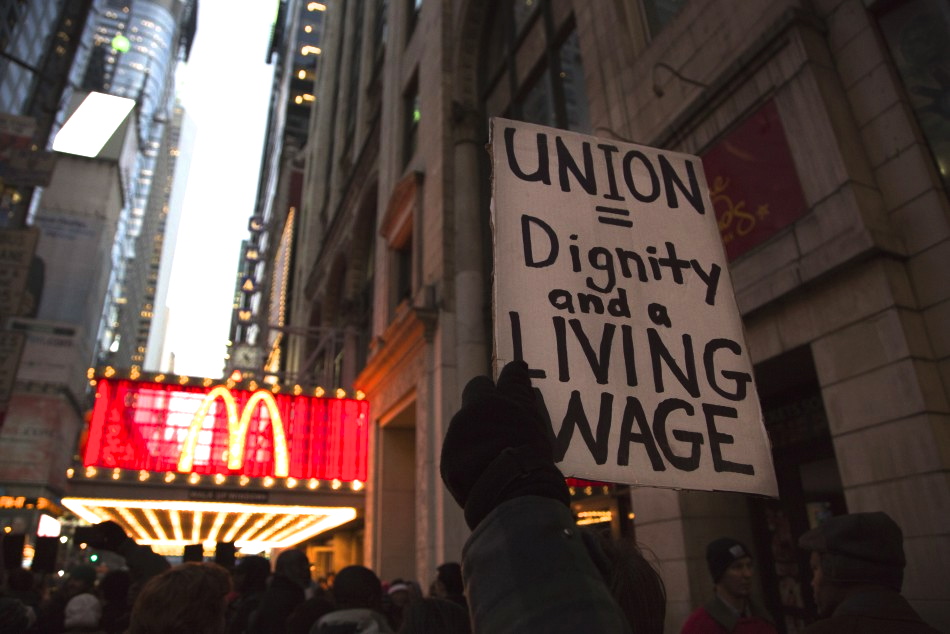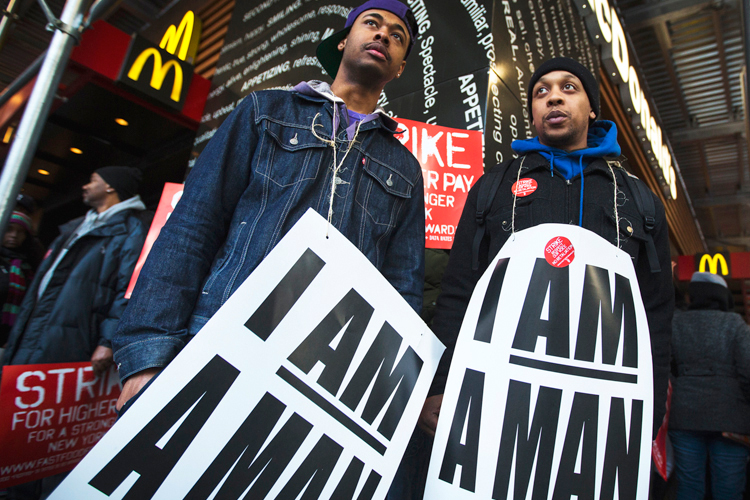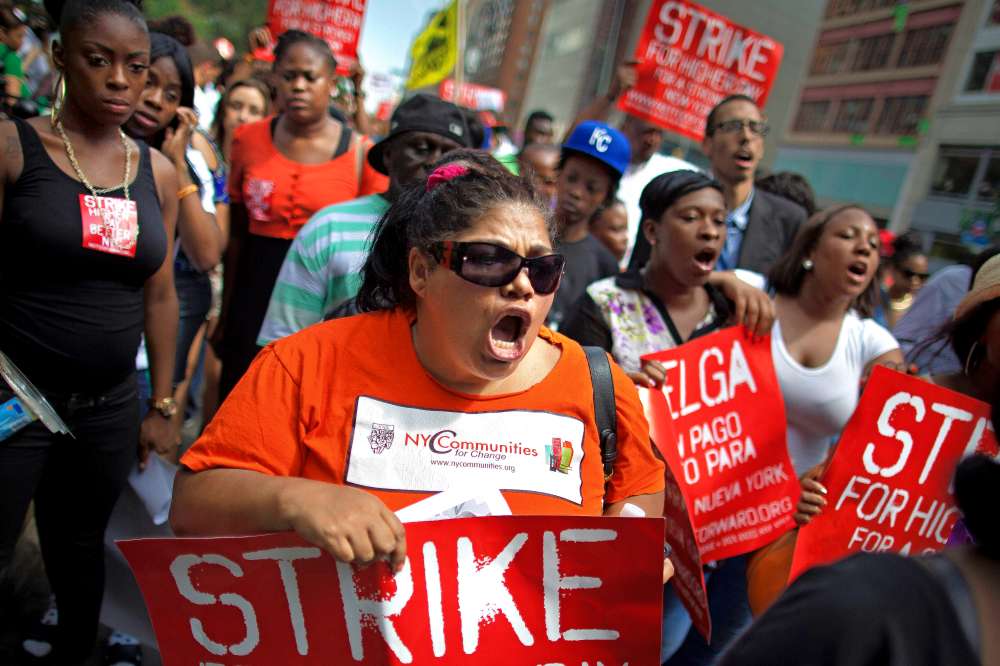Thousands of fast food workers went on strike in cities across the US on Monday as part of a campaign for better wages.
Employees of selected branches of McDonald's, Burger King, KFC and Wendy's walked off their shifts at various points throughout the day. In New York City more than a hundred workers marched to a McDonald's in Union Square, chanting for the restaurant to "supersize" their wages.
The Fast Food Forward campaign is calling for workers to receive a minimum of $15 per hour, more than double the federal minimum wage.
"A lot of the workers are living in poverty, you know, not being able to afford to put food on the table or take the train to work," Jonathan Westin, director of Fast Food Forward, told New York's 1010 WINS radio station.
"The workers are striking over the fact that they can't continue to maintain their families on the wages they're being paid in the fast food industry."
Fast Food Forward began as a New York-specific campaign, but has spread across the country as workers campaign for better pay. Walkouts were to be held in Chicago, Detroit, Milwaukee, St Louis, Kansas City, and Flint, Michigan, as well as New York City. Earlier this month, New York City workers walked out of a McDonald's after they were forced to work in record-high temperatures without air conditioning.
More than a hundred fast food workers – employed at companies including McDonalds, KFC, Burger King and Wendy's – gathered at Union Square in Manhattan at 2.30pm. "Hold the burgers, hold the fries, make our wages supersize," the mostly black and Latino crowd chanted. Many carried red signs – handed out by Fast Food Forward – which read: "Strike for higher pay, for a stronger New York."
Derrick Langley, 27, who earns $7.25 an hour working at a KFC in midtown Manhattan, said the strike was "for respect".
"And for the kids that's coming up too. Everybody that's striking doesn't want them to have to go through the same troubles we went through."
Living on minimum wage in one of the world's most expensive cities was "kind of rough", Langley said. "I'm just here hoping, and praying, and fighting for this change that's going to happen."
Jose Marin, 35, said he had worked at Burger King for seven years. He earns $7.65 an hour.
"I've been busting my ass for seven years for nothing," he said. "I haven't got medical, no nothing on the job. That's not right."
The workers marched 200m or so from Union Square to a McDonald's, where they were met by two private security officers and police. They heard from a series of local politicians keen to get in on the campaigning.
New York state assemblyman Brian Kavanagh, whose district includes the Union Square area, was among those who addressed the crowd, using the 'call and response' amplification technique popularized by Occupy Wall Street protesters almost two years ago.
"We've been working in Albany to raise the minimum wage. And we've only made a little bit of progress so far, as I'm sure you all know," Kavanagh said.
"We're not finished working on that, and more importantly, we can see how much enthusiasm there is and strength there is in this movement focusing on the needs of fast food workers – some of the hardest workers in our city who feed millions of people every day."
Fast Food Forward says people working in restaurants like McDonald's and Burger King are usually paid the federal minimum wage of $7.25 an hour. More than 120,000 people have signed an online petition calling for the restaurants to double this, in a move campaigners says will benefit workers and strengthen the economy.
The average fast food worker in New York City earns an annual income of $11,000, according to the campaign, far below the median household income of $48,631. Most are not full-time employees.
Last week President Barack Obama renewed his call for an improved minimum wage in a speech in Galesburg, Illinois. The president used his state of the union speech in February to campaign for the federal minimum to be raised to $9 an hour, which he said would return the minimum to the same value it had been at the beginning of Ronald Reagan's presidency in 1981.
Burger King spokesman Bryson Thornton said the company's restaurants "have provided an entry point into the workforce for millions of Americans".
"Over 99% of all Burger King restaurants in the United States are independently owned and operated by third party franchisees. As a corporation, we respect the rights of all workers; however, Burger King Corp does not make hiring, firing or other employment-related decisions for our franchisees."
Reached for comment, McDonalds told the Guardian to contact the National Restaurant Association. Scott DeFife, the group's executive vice-president of policy and government affairs, said the restaurant industry was "one of the best paths to achieving the American dream" and "provides opportunities for millions of Americans ... to move up the ladder and succeed".
"Restaurants operate on very thin profit margins. Significant additional labor costs can negatively impact a restaurant's ability to hire or maintain jobs. The cost of living varies greatly nationwide, while current proposals aimed at doubling the minimum wage would have a significant effect on the private sector's ability to create jobs, especially those typically filled by first-time workers and teens."
3 WAYS TO SHOW YOUR SUPPORT
- Log in to post comments














